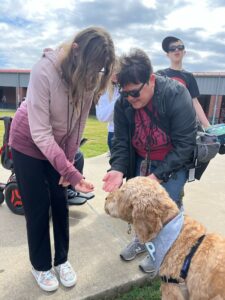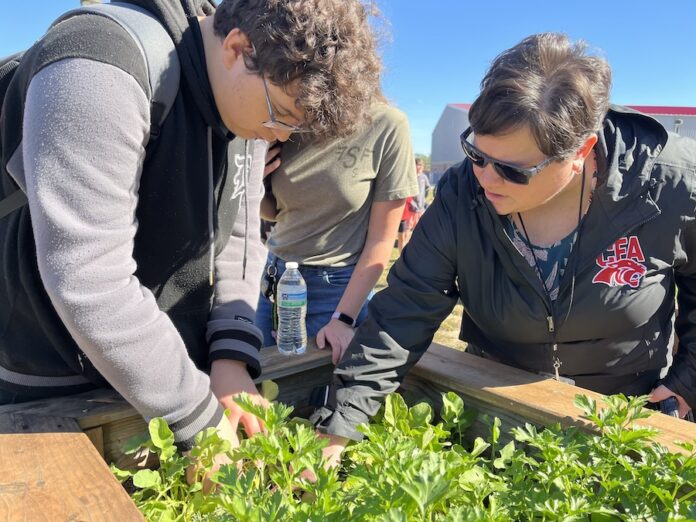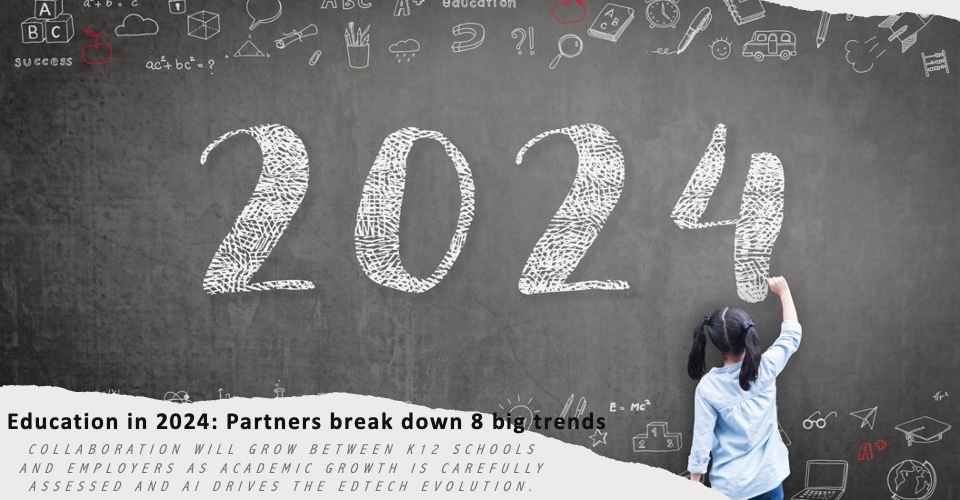Ahna Davis is the rare principal who helped launch the school she now leads. As if that wasn’t achievement enough, Cabot Freshman Academy was one of Arkansas’s first standalone freshman academies when it opened in 2014 and Davis was a founding assistant principal.
“There were no traditions or routines yet,” says Davis, Arkansas’ high school principal of the year. “As a faculty and staff, we got to create the school that we wanted based on shared goals, ideas and philosophies. Ten years later, it is still a fantastic school.”
The academy, part of Cabot Public Schools, aims the bridge the crucial gap between ninth and 10th grades, which is when students are most likely to drop out. Davis recently talked to District Administration about the school’s unique programs (such as “Adulting Day”), how she promote student wellness and her goals for the next few years.
1. What was your role in creating Cabot Freshman Academy?
We opened Cabot Freshman Academy in the fall of 2014. At that time, I was asked to help open the building as an assistant principal. What an experience it was! We built a school from the ground up by putting in systems, assigning rooms, hiring faculty and staff.
The freshman academy concept has been around for about 15 years. Research has shown that most students make the decision to drop out between ninth and 10th grade. Those who are successful in ninth grade have a high likelihood of graduating high school. Students who feel accepted and have a sense of ownership at their school are more likely going to stay the course.
At Cabot Freshman Academy, we try to provide that experience. All of our students are ninth graders experiencing high school for the first time but in a warm, nurturing environment that allows them to begin discovering who they are as young adults by exposing them to various careers, colleges, skills, etc. Our teachers are dedicated to making sure ALL of our students are successful.
2. What programs are unique to the academy?
- College Board Pre-AP for All—We were selected by the College Board to be one of 200 schools to embrace the “Pre-AP for All” concept. As a result, all our math and English teachers took part in a series of training sessions that allowed them to enhance their pedagogy using Pre-AP strategies and techniques. When I say ALL students were assigned to a Pre-AP class, I mean ALL students, including those with special needs. Although our College Board Pre-AP Cohort has ended, our teachers still use those strategies and techniques in their daily lessons.
- Adulting Day—Our entire faculty and staff decide on a life skill they feel students need to know as adults and teach it to them during the first week of school. Adulting Day skills vary from how to change a tire, take care of a pet, tie a tie or even set up a checking account. We offer over 60 different sessions for them to choose from. It is probably one of my favorite activities that we offer.
- Mock Interview Days—These occur once in the winter and once in the spring. Every student is required to take our Professional Communications class. One of the frameworks is that students learn how to write resumes, and cover letters and engage in an interview. Community members, teachers, district administrators and even fellow building principals, set aside some time to conduct interviews with the students throughout the day. The students dress up in their best attire, present them with their résumés and participate in a mock interview as if they were really applying for the job. So many of our students come back and thank our teachers for teaching them this skill because it helped them acquire a job later on.
- Commitment to Graduate (C2G) program—This program is the foundation of all we do at CFA. Our mission statement is “Graduation Starts Here.” Our No. 1 focus is to ensure that ALL students leave with all of their credits and are on track to graduate. Over the last 10 years, we have averaged right at 97% of our students leaving our school with all of their credits. Our C2G program was put in place to allow us to ensure that we are doing all we can to help students succeed. The actual program is a 40-minute period of time built into our daily schedule that allows students to seek help from a teacher if they need it, or teachers can assign students for intervention if they are lacking in skills needed to be successful. We also offer enrichment and extensions during this time period, as well. For example, students can choose to participate in our “Walk-It Out” program, Gardening Club, take a master class where they acquire skills above and beyond what they would learn in class and we even offer self-care sessions to allow students time to decompress.
3. How do you create an environment that promotes student well-being? What are the hallmarks of this environment?
“We want every student to feel like they matter and have a voice. Although it may sound cliche, we truly do provide opportunities for students to be successful in all aspects of their lives. I have worked in several schools, and I can truly say that we want the well-being of every student we serve to be at the forefront.

If a student is in a bad place mentally, physically or even socially, then the academic piece is the last thing on their mind. We truly do take the initiative in ensuring that the whole child is addressed. One of the things I am so proud of in regard to our students and what we offer them to be healthy, happy students is our annual Self-Care Day.
I thought of this concept about two years ago and asked our counselors to make the thought and idea come to life. Let me tell you, they did it! They asked local community leaders, therapists, churches, outreach programs, our district administrators, other building administrators and even our own teachers to lead sessions on self-care and mental health issues. Our students have embraced it, and because of that, we feel they have taken on tools to help them navigate the struggles of being a teenager.
Our district has also allowed principals to train and use service dogs in our schools. I bring Gus, our school dog, every day to school to help provide happiness and bring down anxiety in our students, faculty and staff. There’s just this sense of belonging and comfort that only a dog can bring. It is funny because I always say that people would much rather see Gus than me on a regular basis. He truly has been a blessing to our school.
We also have various programs in place to catch our at-risk students early. Our superintendent, Tony Thurman (who is awesome by the way), listened to my concerns regarding hiring a dedicated person (a student support coordinator) to help identify, track and intervene with students who have all the factors we deem as at-risk so that we can provide point-in-time help.
As a result, we have had students who had zero confidence in themselves and their abilities begin to shine. Their confidence in school and within themselves blossomed, and the transformation and excitement they showed when they passed all their classes or saw that their teachers truly cared about them was an amazing sight to see.
4. How would you describe other aspects of your leadership philosophy?
“I am a very hands-on leader, but I also trust people to do their job. To me, we are all in this together. No one person is any more important than anyone else. We all have one goal in mind to move our school forward and make it the best place it can be.
We are a team and that has always been the philosophy I have followed. Yes, the ultimate decision lies on me, but I take time to listen to our teachers and staff to make an informed decision so that it benefits our school as a whole, not just a few. I also want to empower teachers and staff in our building to go above and beyond and to take ownership in our school. I am a firm believer in believing in those who I serve and letting them shine. In the end, we all win, including our students.”
5. What exciting things are happening this year at Cabot Freshman Academy? What are your goals over the next few years?
“We have so many great things happening at our school. We have started year two of the Arkansas Department of Education PLC Project as a member of Cohort 6. We were one of 10 schools chosen to be part of Cohort 6 last year. It is a three-year process that we hope will lead us to becoming a model PLC school.
Read more from DA: 5 first-time superintendents are moving into the top spot
We are going to continue doing all of the great things we have done in the past, such as our annual college visits, career fair, adulting day, Red River Reading Program and so many more things that help students become the best that they can be. We live and breathe our mission of “Graduation Starts Here” every single day. We want our students to be prepared and ready for the next step.
Our goals include becoming a model PLC school. We would love to get over the high ‘B’ hump and earn an A on our school report card. We are so close. Plus, we want to continue the work that we started 10 years ago ensuring that ALL of our students leave with all of their credits and on track to graduate.”
6. What are the biggest challenges your school is facing right now?
“We have a great school, but we do face challenges just like other schools in our state and nation. We understand the importance of mental health and helping students overcome the challenges they have in regard to their mental health. We have been working hard to help inform our teachers in regards to trauma-based practices, understanding the issues that our students enter their classrooms with and just being able to give them tools to help those students.
It is hard because everyone struggled with the pandemic and the issues that we once thought were only minimal are truly coming to light. To us, time and being able to keep up with the demands that our students need to be healthy both mentally and physically can be challenging. However, we are slowly mending that gap and helping our teachers and students overcome those challenges.
Another challenge is closing the academic gaps gained during COVID. We have really honed in on our RTI program during C2G to provide more prescriptive interventions to students who may still lack the skills they need to successfully move forward. One of those skills is reading. We have asked all of our teachers—core and non-core classes—to take a more proactive approach to reading in their classrooms.
Our media specialist has created our Red River Reading program we begin every January after the holiday break to get students geared up for the state tests. As a faculty, we know that reading is the No. 1 fundamental indicator of a student’s success. If students are confident in reading, everything else will fall into place.”










